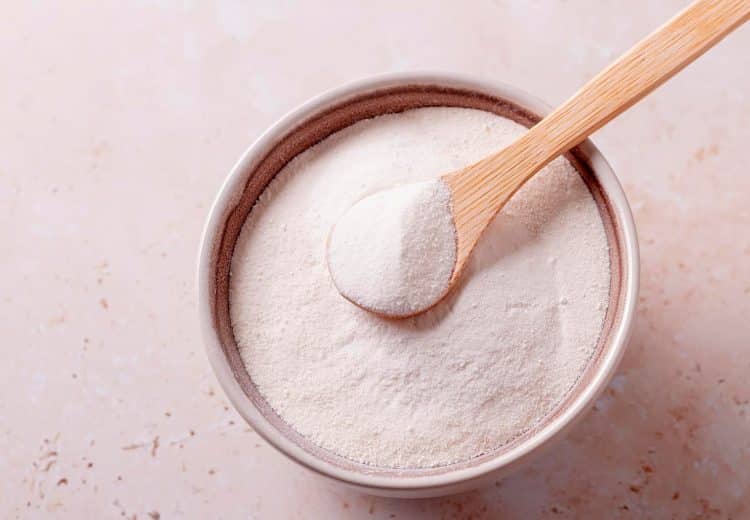We all know that protein is the key macronutrient for muscle growth. And when it comes to a protein supplement, most people immediately think of whey. Yet, while it’s the most popular protein supplement, whey isn’t the only one — and it may not even be the best.
Collagen represents the most abundant protein in your body. It is available in several supplement forms, including as a powder that can be added to shakes. So, how good is it for muscle growth? In this article, we discover whether collagen supplementation can help you pack muscle tissue.
What is Collagen?
Collagen is the most common protein in the body, representing between 25-35% of your total protein. The connective tissue that constructs your muscles, ligaments, skin, and tendons is made from it.
Collagen is made from the following three amino acids:
- Proline
- Glycine
- Hydroxyproline
Depending on their configuration, these amino acids will produce one of 28 different collagen forms. The four most common forms are:
- Type I
- Type II
- Type III
- Type IV
Type I collagen represents 90% of the total collagen in your body. This dense form of collagen is responsible for the structure, support, and strength of your skin, bones, ligaments, and tendons.
Type II collagen is found in joint ligaments, where it enhances elasticity. It is also part of the intervertebral disc material that cushions the spine.
Type III collagen is contained in muscle, skin, and blood vessels.
Type IV collagen is found in the layers of the skin and ears, and kidneys.
Collagen is part of what is called the extracellular matrix. As such, it involves the construction and structure of every cell in your body.
As we age, our bodies produce less collagen. This decline begins in our late 20s or early 30s and is a major contributor to the wrinkles, joint stiffness, and sagging skin that are the hallmarks of aging. Lifestyle factors such as poor diet, smoking, and excessive exposure to the sun may exacerbate age-related collagen loss.
Collagen supplementation has become popular over the last decade or so to replace the amounts we naturally lose and for its claimed health benefits. Collagen supplements come in various forms, including collagen peptides, which are usually sold in powder form, collagen capsules, liquid collagen, and collagen chewable or gummies.
There are four main sources of collagen for use in supplements:
- Bovine (cow)
- Porcine (pig)
- Marine (fish)
- Poultry (chicken)
Benefits of Collagen Supplementation
Collagen supplementation has been shown to provide the following health benefits:
Improves Skin Health
Collagen is well-known as a skin rejuvenator and is used in most skin health products to help reduce wrinkles and replenish skin health. There is some solid science backing up collagen’s ability to enhance skin health. One study involved 114 women aged between 45 and 65. Over eight weeks, the women took either 2.5 grams of collagen or a placebo. At the end of the study period, the collagen group had reduced their wrinkles by 20%.
The researchers found that the supplementation increased elastin production and stimulated the body to produce its own collagen. As the anime suggests, elastin boosts the skin’s elasticity to help prevent wrinkles. [1]
Eases Joint Pain
Joint pain is often a result of degenerative bone disease or a breakdown of bone cartilage. Collagen supplementation can help by building up your protein stores to rebuild cartilage. It also stimulates the body to produce more natural collagen to contribute to this building process.
In one study published in the Journal of Agricultural and Food Chemistry, 80 people with severe joint pain were given either 2 grams of collagen daily or a placebo for 70 days. The collagen group experienced a decrease in joint pain from Day 35 onwards. The pain progressively decreased up to Day 70. [2]
Hormonal Balance
Collagen plays a big part in modulating hormones, especially estrogen. Once more, glycine is the key player here. This amino acid helps to activate estrogen receptors. This helps to channel the free estrogen floating around in your system and use it effectively. Doing so will help to prevent such problems as water retention and oxidative damage.
Promotes Better Sleep
One of the main reasons that people have trouble sleeping is that they are overheated. The most abundant amino acid in collagen is glycine, which has been shown to be able to cool the body. It does this by acting upon the NMDA receptor, which relaxes the blood vessels, allowing blood to flow more effectively through the body. This helps to cool the body down.
Glycine also inhibits a neuropeptide called orexin, which stimulates arousal and wakefulness. So taking collagen can help diminish its effects, helping us attain the relaxed, calm state needed to fall asleep.
Improves Liver Function
The glycine that makes up collagen assists in creating bile, the body’s main fat emulsifier. If we cannot produce enough bile, we will feel bloated and sick after eating a fatty meal. By supplementing with collagen, you can get the glycine you need to kickstart the bile production process. [3]
Collagen also helps offset liver inflammation resulting from excessive alcohol consumption.
Promotes Muscle Recovery
Collagen has been shown to improve muscle recovery after an injury. In one study, researchers found that collagen taken directly after a muscle rupture was able to significantly improve muscle recovery. It was noted that, following the injury, the body was, in effect, screaming out for more collagen. The researchers identified that the injury site needed more Type III collagen straight away; however, weeks later, there was still a demand for more collagen, but this time the Type I version.
Enhances Brain Functioning
Collagen helps support a healthy brain-blood barrier by exchanging compounds between the blood and the brain. The anti-inflammatory effects of collagen also protect the brain. There is also emerging research that suggests that collagen may play a part in neurogenesis, the formation of new brain cells.
Can Collagen Increase Muscle Mass?
Being the most abundant protein in the body, you’d think that collagen must have a role to play in building muscle, which is made of protein. And you’d be right — at least in people with sarcopenia (age-related muscle loss). Sarcopenia affects all men once they reach the age of around 30, with a loss of about 3-5% of total muscle mass every decade from 30 onward.
In a study by Zdzieblik et al., 53 men with an average age of 72 were put on a 12-week resistance training program. Half of them were given a daily dose of 15 grams of collagen, while the other half were given a placebo. Post-study testing revealed that the collagen group had a significantly greater increase in fat-free mass (4.2 kg average compared with 2.9 kg for the placebo group). Muscle strength gain and fat loss were also greater in the collagen group. [4]
Scientists believe that a key mechanism by which collagen boosts muscle growth when combined with resistance training is that it improves muscle protein synthesis and acts as a stimulus for muscle repair and growth after a strenuous workout.
Collagen has been shown to be especially good at inducing protein synthesis in people on a low-protein diet. Of course, most people trying to add muscle are just the opposite, but if you are on a keto diet or follow an intermittent fasting protocol, your protein intake will probably be lower than normal.
Collagen is an excellent source of the amino acids glycine and arginine, both of which are ingredients in creatine. So, when you take a collagen supplement, you are also ingesting two key building blocks of creatine. Creatine synthesizes ATP from the moment you start your workout. It’s what powers you through the initial seconds of your workout. In other words, a collagen supplement will help you generate maximum strength at the start of your workout. That is why the elderly men in the study cited above had an increase in muscle strength while those on a placebo did not.
Is Collagen Better Than Whey for Muscle Gain?
When it comes to supplements, many people have an either-or mentality. They need to know if this is better than that so that they can choose one over the other. The reality is that, in many cases, supplements are complementary. That is certainly the case when it comes to whey and collagen protein.
Whey could be considered a ‘better’ source of protein for muscle growth than casein because it contains more BCAAs (branched-chain amino acids). The three BCAAs – leucine, valine, and isoleucine — are the key drivers of protein synthesis.
Whey protein is a by-product of the cheese-making process. Whey liquid is dehydrated to form a powder. Whey protein is valued because it contains all nine essential amino acids and is fast digesting. Collagen, in contrast, is not an essential amino acid. Though high in glycine, proline, and hydroxyproline, it is relatively low in tryptophan, methionine, and histidine.
A 2018 study directly compared whey and collagen’s ability to build muscle. Eight men were given either 22 grams of whey or collagen protein 45 minutes before exercising, 22 grams intra-workout, and another 22 grams post-workout. The workout consisted of a 75-minute intensive cycle session. The post-study analysis revealed that the whey group had significantly greater protein synthesis levels. This was attributed to the higher levels of BCAAs in whey protein. [5]
A 2009 study by Hays et al. compared the nitrogen balance that results from whey and collagen supplementation. Nitrogen balance relates to the relationship between the level of nitrogen that enters the body through the diet and the levels that the body excretes. Positive nitrogen balance is needed to build new muscle. In this study, nine healthy women were given a whey protein supplement for 15 days. After a one-week washout period, they were given the same amount of collagen for 15 days. The analysis showed that the women had significantly higher levels of positive nitrogen balance during the collagen trial. [6]
The researchers also noted that, while collagen has a lower protein digestibility, on a per-gram basis, those proteins contained more nitrogen. This boosts the level of available nitrogen in the body, meaning that you can be in a higher nitrogen balance with less protein intake than you’d need if you were taking another protein source such as whey.
These studies confirm that collagen plays a vital role in building muscle. It boosts protein synthesis and promotes positive nitrogen balance. This is different from the muscle-building potential of whey protein, which is mainly based on its high levels of BCAAs. Ideally, you should take both collagen and whey protein supplements to maximize your muscle-building potential. In other words, you get more bang for your buck from collagen when it comes to maintaining a positive nitrogen balance.
Collagen Dose for Muscle Growth
The best way to determine the effective dosage for a supplement is to consider the dosages used in clinical studies. In the case of collagen, the study dosages range from 2 to 15 grams per day. If you’re training hard to build muscle, you should err on the higher side because your stressed muscle will have a higher demand for nutrients.
We recommend taking 15 grams of collagen daily for muscle growth.
Side Effects
While collagen supplementation is safe for most people, some may experience unpleasant effects due to intolerance or excessive dosage. Collagen supplements may be manufactured from fish and eggs, so people with an intolerance or allergy to these foods should look for an alternative source that is safer for them.
The following side effects may be experienced:
- Skin rash
- Acne
- Inflamed skin
- Scar tissue (fibrosis) in the liver
- Kidney stones
- Stomach upset
- Diarrhea
- Constipation
- Heartburn
- Abnormal heart rhythm
How Long To Take It
Collagen takes a relatively long period to be synthesized in the body and deliver noticeable results. Don’t expect results any sooner than six-eight weeks after beginning collagen supplementation.
The average length of collagen studies is about eight weeks. There have been no reported negative effects of long-term collagen use.
Alternatives
Collagen contains a unique chemical makeup, so finding a like-for-like substitute is not easy. Keratin, which is another form of protein found in hair, nails, and skin, has been promoted as a collagen substitute, but the existing research does not support its ability to replicate the benefits of collagen supplementation. [7]
There have been attempts to cater to vegans wanting to supplement with collagen. By adding human collagen genes to yeast, it can produce its own form of collagen.
You could also purchase individual supplements that contain the three key amino acids in collagen production; glycine, lysine, and proline.
Wrap Up
Several studies support collagen’s ability to promote muscle growth. It appears to simulate both muscle protein synthesis and the positive nitrogen balance needed for it to occur. When you combine this with the other research-backed benefits of taking collagen, it appears that taking collagen is a smart choice. A great way to get your collagen is in the form of a bone broth. To make bone broth, you simmer animal bones and connective tissue, which releases collagen and other nutrients into the liquid. Bone broth also contains muscle growth-promoting minerals such as magnesium and calcium.
I’ve been taking collagen in the form of bone broth for several years. I take a cup of it about an hour before my workout. Then post-workout, I have a whey protein shake. Combining collagen and whey in this manner gives me the best of both worlds. Whether you take collagen in the form of a powder, bone broth, capsule, or liquid, get into the habit of consuming it daily, and your muscle growth potential will get a serious boost.
References
Fitness Volt is committed to providing our readers with science-based information. We use only credible and peer-reviewed sources to support the information we share in our articles.
- Proksch E, Schunck M, Zague V, Segger D, Degwert J, Oesser S. Oral intake of specific bioactive collagen peptides reduces skin wrinkles and increases dermal matrix synthesis. Skin Pharmacol Physiol. 2014;27(3):113-9. doi: 10.1159/000355523. Epub 2013 Dec 24. PMID: 24401291.
- Schauss AG, Stenehjem J, Park J, Endres JR, Clewell A. Effect of the novel low molecular weight hydrolyzed chicken sternal cartilage extract, BioCell Collagen, on improving osteoarthritis-related symptoms: a randomized, double-blind, placebo-controlled trial. J Agric Food Chem. 2012 Apr 25;60(16):4096-101. doi: 10.1021/jf205295u. Epub 2012 Apr 16. PMID: 22486722.
- Yamashina S, Ikejima K, Enomoto N, Takei Y, Sato N. Glycine as a therapeutic immuno-nutrient for alcoholic liver disease. Alcohol Clin Exp Res. 2005 Nov;29(11 Suppl):162S-5S. doi: 10.1097/01.alc.0000189281.82523.6c. PMID: 16344603.
- Zdzieblik D, Oesser S, Baumstark MW, Gollhofer A, König D. Collagen peptide supplementation in combination with resistance training improves body composition and increases muscle strength in elderly sarcopenic men: a randomized controlled trial. Br J Nutr. 2015 Oct 28;114(8):1237-45. doi: 10.1017/S0007114515002810. Epub 2015 Sep 10. PMID: 26353786; PMCID: PMC4594048.
- Impey SG, Hammond KM, Naughton R, Langan-Evans C, Shepherd SO, Sharples AP, Cegielski J, Smith K, Jeromson S, Hamilton DL, Close GL, Morton JP. Whey Protein Augments Leucinemia and Postexercise p70S6K1 Activity Compared With a Hydrolyzed Collagen Blend When in Recovery From Training With Low Carbohydrate Availability. Int J Sport Nutr Exerc Metab. 2018 Nov 1;28(6):651-659. doi: 10.1123/ijsnem.2018-0054. Epub 2018 Oct 1. PMID: 29757056.
- Hays NP, Kim H, Wells AM, Kajkenova O, Evans WJ. Effects of whey and fortified collagen hydrolysate protein supplements on nitrogen balance and body composition in older women. J Am Diet Assoc. 2009 Jun;109(6):1082-7. doi: 10.1016/j.jada.2009.03.003. PMID: 19465192.
- Mokrejs P, Hutta M, Pavlackova J, Egner P, Benicek L. The cosmetic and dermatological potential of keratin hydrolysate. J Cosmet Dermatol. 2017 Dec;16(4):e21-e27. doi: 10.1111/jocd.12319. Epub 2017 Feb 6. PMID: 28164425.
Tip: If you're signed in to Google, tap Follow.














